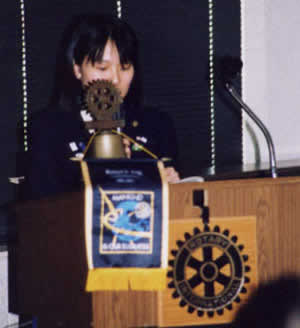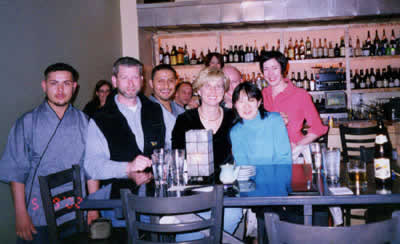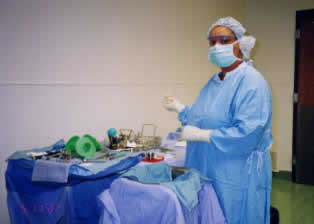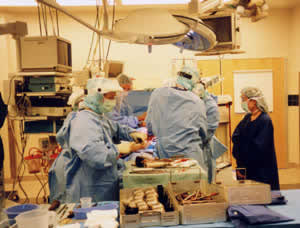
Nurse, Shitennoji Hospital
Sponsored by the Osaka-Tennoji Rotary Club
Introduction
I had the privilege of participating as a member of the D-2660 GSE trip to
the state of Wisconsin in the United States of America. I was sponsored by the
Osaka-Tennoji Rotary Club and spent one month in Wisconsin visiting Rotary International
District 6270. I am deeply grateful to everyone who recommended me for the program,
to all the wonderful Rotarians in D-2660 and to everyone else who was a part
of this program.
Participating in the GSE program was my first experience with Rotary International,
whose existence I had not even been aware of. Through my taking part in the
program, I believe I was able to gain an understanding of the Rotaryユs activities
and, to some degree, the Rotary spirit. I am so happy to have had the opportunity
to be a part of the GSE program.
I would like to take this opportunity to share with you some of the things I
learned during my vocational study during my one month in America, as well as
how I felt and what I saw with my own eyes while there. I hope that what I write
will be helpful in some way to any other health care workers who may participate
in this program in the future.
Preparing for Departure
From the beginning of the year, our GSE team met almost weekly to work on the
GSE presentation we would be giving at the various Rotary Clubs we were to visit
in Wisconsin.
Deciding on what we were going to do was, of course, difficult, but the selection
of the photographs we would use in our presentation was much more difficult
than I had imagined. We somehow managed to decide on the content of the presentation
and get it all written down, but there was still something very important that
we had to do ム translate the presentation into English! This was a very difficult
job. I knew that there was no way I could express in English everything I wanted
to say in Japanese. This is because there was a limit to what I was able to
express in English. But, there was nothing to do but give it a try, so I rewrote
and changed things so that I was able to express those ideas in English. It
was quite hard, but in the end I managed to finish writing my English presentation
just two weeks before we left for America.
Then, my presentation was given a final check by a GSE committee member, who
listened to my presentation and gave me some pointers regarding the content
and had some rather severe comments about my English ability (or lack thereof).
With some trepidation in my heart, I awaited the day of departure, and on May
1, 2002, I left for the United States with both expectation and uneasiness in
my heart.
Meeting the American GSE Team Again
When the GSE team from Wisconsin left to return to America, we didnユt say メGood-byeモ
to them. Rather, we said, メSee you in America.モ For this reason, I was really
looking forward to seeing them again in America. Before we left Japan, I was
very much encouraged by the memories I had of their time with us here in Japan.
We were able to get together with all the Wisconsin GSE team members one week
after we arrived. I felt very relieved when I saw all their faces again. I felt
much closer to them in Wisconsin than I had in Japan. Meeting them again filled
me anew with a strong desire to do my best and learn all I could during my remaining
time in America.
Attending Rotary Meetings and Giving Our Presentations
We had several opportunities to attend Rotary Club meetings during our time
in America. The atmosphere at those meetings was slightly different than that
at Japanese Rotary Club meetings. Unlike Japan, everyone was not wearing a suit.
Some people were dressed casually. I had the opportunity to talk with many Rotarians
at each of the meetings we attended, and it was a happy time of both meeting
new people and renewing friendships with those I already knew.
 Giving presentation
Giving presentation
Our first presentation was given at the District Conference. The uneasiness
and nervousness I felt was unbelievable, seeing that our first presentation
was going to be at such a large gathering. I wondered if the people would really
be able to understand my English, but in the end, it went without a hitch. Afterwards,
I asked some of the people there what they thought about the content of the
presentation and if they were able to understand my English. I think they were
flattering me, but they said, メGood job!モ Their words made me feel good, though,
and I was determined to do better the next time.
At the suggestion of another team member, we decided to try a little ad-lib
during our second presentation, and amazingly it turned out to be fun. I felt
that we got better with each presentation. Perhaps it was because we were no
longer afraid of doing a poor job. It was impossible to give my presentation
in perfect English, but I realized that if I was able to say the things I wanted
to say in an understandable way, it was enough. I canユt put it into words well,
but I feel now that the experience of giving my presentation (in English, no
less!) gave me confidence.
My Host Families
I had the privilege of staying with five host families during my time in Wisconsin.
This was not my first experience staying with a host family, but I was a bit
nervous about having to change families every four or five days. This is because
I thought I would be moving on to a new family just about the time we were finally
grew accustomed to each other. But there was no need to worry. The moment I
arrived at a host familyユs home, I was warmly welcomed and told I was to be
just like a member of the family. Of course, there were times when I was unable
to express myself well, and times when we were completely unable to make ourselves
understood to one another. But, looking back on it now that the GSE trip is
over, I think that those times, too, were an enjoyable part of my life overseas.
 A Japanese restaurant
in Milwaukee
A Japanese restaurant
in Milwaukee
I want to take this opportunity to, once again, say how grateful I am to all
my host families. I am overflowing with thanks for all they did for me.
Preparing for My Vocational Study
Honestly speaking, I did not prepare much for my vocational study. All I did
was look up the English words that were related to my field of interest. I felt
rather uneasy about going on vocational study. But actually, since we were talking
about things related to my profession, there werenユt any instances when I was
completely unable to understand what people were trying to say to me. Rather,
it seemed to me that those times of conversation went smoother than my times
of daily conversation with others.
However, there were times when I was really at a loss as to what to say when
people asked me a question, and that was when I was asked to explain the Japanese
health insurance system. To be honest, I hadnユt given it much thought until
then. Naturally, I was unable to give a good answer. I wondered why in the world
they were asking such a question. If there is ever anyone else in the health
care industry who is planning to participate in the GSE program, I recommend
that you at least study the basic framework of the Japanese national health
insurance system before going overseas.
Vocational Study
1) My specialty as a nurse
The very first thing I was asked, wherever I went, was this: "What is
your specialty?" I would answer, "I work in the operating room."
Then they would ask, "What is your specialty?" I realized then that
there is a difference between the way American and Japanese nurses view their
work. The women I met are specialists. One of the nurses that showed me around
said to me, "Since there aren't any heart operations being performed today,
I will show you around the hospital." In other words, her specialty is
assisting surgeons during heart surgery. Naturally, if there aren't any heart
operations, she has free time on her hands.
Of course, her job is not only helping in heart surgery, so she could do other
things during this time... I thought to myself. But, she did not assist in any
other kind of surgery (such as stomach surgery). Deep down, I envied her. At
the same time, I couldnユt help but feel the strictness of American nurses. Perhaps,
the degree of specialization is high because the doctorsユ expectations of nurses
are also higher than here in Japan. To be sure, education in both countries
is fundamentally different.
 A nurse prepping
for surgery
A nurse prepping
for surgery
Anyway, having the chance to experience an American health care facility firsthand
was a very stimulating experience for me.
2) The difference in staff make-up
I had the opportunity to be present during an actual operation while I was
in America. I was surprised by the staff make-up. First, there is usually only
one surgeon in the operating room (even during heart surgery), and the surgeon
has two or three assistants. By "assistants" I mean medical school
students, nursing school students and nurses or technicians. Let me explain
what I mean by "technicians." These people study for two years to
learn all the specialized knowledge they will need to perform their job in the
operating room. They are allowed to do many things that, in Japan, only doctors
are allowed to do. For example, suturing after the operation is complete.
In America, nurses are allowed to administer anesthesia. Of course, it goes
without saying that these "nurses" are different than the nurses in
Japan. In this way, I was able to experience for myself the many big differences
between medical practice in America and Japan.
3) The relationship between doctors and assistants
The thing I felt most envious about after seeing American health care facilities
was the relationship that exists between the doctors and assistants. Their positions
and viewpoints may be different, but their relationships are based upon equality.
They exchange their opinions with one another based on their different positions.
I didnユt get the impression that there was anything like the top-down chain
of command that exists in Japan, where the doctor gives all the orders. Also,
American doctors trust in their assistants deeply. Even in the operating room,
where tensions tend to be at their highest, things were very relaxed. The atmosphere
was very peaceful. I had never experienced anything like it before. Of course,
I was only able to see a small part of what takes place in American hospitals,
and I am fully aware that I cannot say anything authoritatively one way or the
other about the entire system in the United States. Still, perhaps the warm
atmosphere I experienced in the operating room was the result of the trusting
relationships that exist between the doctors and assistants.
 Observing a hip
replacement operation (I'm on the right.)
Observing a hip
replacement operation (I'm on the right.)
4) One-day (outpatient) operations
In America, most of the operations are completed in one day, meaning that the
patients do not spend the night in the hospital. I even heard that heart operation
patients stay only three or four days in the hospital. Of course, this was a
great surprise to me. In recent years, some operations have become one-day operations
(such as cataract surgery, etc.). However, if someone has a heart operation
in Japan, they must stay in the hospital for at least two or three weeks. I
was able to meet some patients who came for surgery. They came to the hospital
that day with their family, as if it were a minor outpatient procedure. They
wait with their family in the waiting room until just before the operation is
scheduled to begin. There was absolutely no impression given that they were
there to have an operation.
The health insurance system in the United States seems to be a major reason
behind this approach. In other words, the medical care costs are quite high,
and some insurance companies will not cover some or all of the costs. If you
have an operation in America, it costs about $300 for every fifteen minutes
you are in the operating room. If you have a two-hour operation, the operating
room fee alone comes to $2,400. On top of that, there are costs for pre- and
post-operative examinations, consumables, medicine, and other costs, so the
total can be quite high.
5) Business hotel-style rooms
I was surprised when I saw the patientsユ rooms, the waiting room, the ICU rooms
and the ER rooms. They are all private rooms, and they looked very much like
a business hotel room in Japan. Considering land costs and other issues, it
is impossible to compare our two countries, but I was stunned by the size of
the rooms and the facilities provided in each room. Privacy is given serious
consideration in America, and I think it makes for a very comfortable stay for
the patients. If an American person were to stay at a Japanese hospital, Iユm
sure he would be very surprised by how small the rooms are.
It goes without saying that the corridors were quite wide and the open space
in front of the elevators was larger than in Japan. Also, there were pictures
hanging on the walls in the hallways, and it seemed to me that the American
approach is superior to here in Japan when it comes to helping to remove some
of the unique atmosphere found in hospitals.
6) Independent patients
I had almost no opportunity to talk directly with American patients, but considering
a number of things, it seems to me that they are much more independent than
Japanese patients. This is because here in Japan, there are many people who
take what the doctor says to be absolutely correct. Recently, we sometimes hear
the expression メsecond opinionモ in Japan, but just how many people actually
go out and get another doctor's opinion? I think it is very few. In America,
though, it is a very natural thing. Maybe many doctors even encourage their
patients to get a second opinion. Whatユs more, since most operations are one-day
operations, American patients feel that if they donユt clearly understand their
illness and take some responsibility for their operation, there is the possibility
that they will be putting themselves in danger. Perhaps this is why informed
consent is so thoroughly promoted in the United States.
I think Japan has a long way to go in this regard. I wonder if, in Japan, there
will be more effort put into promoting informed consent in the true sense of
the word. This is only my opinion, but I want Japanese patients to have more
courage to face their illnesses head on and take a positive approach toward
their treatment. There are only a few hospitals that provide hospice care, and
there are still many problems in this regard, but it is my hope that in the
future doctors and hospitals will consider it only natural to inform their patients
if they have cancer.
7) Reporting on my vocational study trips
I gave considerable thought to what I should discuss in my report. I work in
the operating room, and there were a number of detailed points that were very
educational for me (things I thought should be applied here in Japan). But,
in the end I didnユt go into great detail about those points.
This is because there will probably be only a few people reading this report
who would have been able to understand what I was saying. So, I chose to write
about the things I felt overall, and to honestly share my opinions without embellishing
anything. For this reason, there may be some who feel that something is lacking
in my report, and I ask for your understanding.
In Conclusion
I was able to complete the one-month itinerary without any problems and return
to Japan. Looking back on my trip, it seems that the month, which should have
been long, passed by in a moment. Now, as I sit here going over my report and
thinking about everything again, many things come to mind. I donユt think I have
a clear understanding yet of all that I experienced during a whole month in
a different culture, but I believe that the time will surely come in the future
when I will be able to make the most of those experiences in my life. By this
I mean that it is possible that it will be sometime in the future when I am
able to understand just how good it was for me to participate in the GSE program.
No matter what happens, it will surely become a page in the story of my life.
Finally, I would like to again express my gratitude to everyone who helped
me throughout the GSE program.